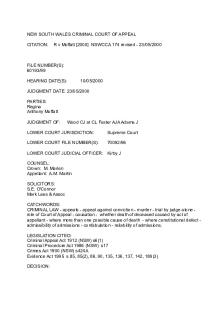Hill v. Gateway 2000 , Inc. PDF

| Title | Hill v. Gateway 2000 , Inc. |
|---|---|
| Course | Sales Law |
| Institution | Touro College |
| Pages | 2 |
| File Size | 78.8 KB |
| File Type | |
| Total Downloads | 29 |
| Total Views | 168 |
Summary
Sales Law Spring Lecture Notes - Case Analysis chapter 1...
Description
SALES Lecture Notes Hill v. Gateway 2000, Inc. Rule: Under the Uniform Commercial Code, a purchaser may be bound to terms included in product packaging if the purchaser has an opportunity to review the agreement and reject it by returning the product. Issue: Can a purchaser be bound under the Uniform Commercial Code to an agreement that is included in the product packaging and provides the purchaser time to review the agreement and reject it by returning the product? Holding: Yes. A consumer may be bound by terms of an agreement included with a product once the consumer has had an opportunity to open the package, review the terms and reject the terms by returning the product. In ProCD Inc.v. Zeidenberg (1996), this court found that a purchaser of a software program was bound by the agreement included in the software because by using the software, the purchaser had an opportunity to review the terms of the agreement and to reject the terms by returning the product. ProCD applied the Uniform Commercial Code (U.C.C.), which also governs this case, so ProCD applies to this case. Here, the Hills kept the computer for more than 30 days, even though the agreement included in the package stated that they had 30 days to return the computer if they did not agree with the terms of the enclosed agreement. Like the defendant in ProCD, the Hills had an opportunity to review the terms of the agreement and their acceptance of those terms was effective when they failed to return the computer within 30 days. The Hills’ arguments to the contrary fail to produce a different result than ProCD. First, the Hills argue that ProCD should only apply to sales of software programs; however, the practical considerations against requiring cashiers to read contract terms over the phone when customers place an order are not limited to software. Moreover, since the Gateway computer shipped with software that was critical to its operation, this case cannot be factually distinguished from ProCD on this basis. Second, the Hills argue for limiting application of ProCD to executory contracts. However, the holding in ProCD pertains to formation of the contract, not its performance. Since important performance remains incomplete, including Gateway’s promise of lifetime support, there is no factual distinction between ProCD and the instant case. Both involve executory contracts. Third, the Hills argue that ProCD is distinguishable because the customer in ProCD was a merchant and they are not. However, ProCD did not have to make this distinction because there was only one form involved, and consequently, the U.C.C. provisions governing conflicting documents in a “battle of the forms” did not apply. Therefore, the result in ProCD applies to merchants and consumers alike. Lastly, there was no need for Gateway to include a notice on its shipping package that additional terms were contained within. The Hills ordered the computer by phone rather than buying it from a store. Thus the packaging served a different purpose. Moreover, the Hills had other means to obtain the terms, such as asking for the terms in advance, or researching the information online. Because the Hills kept the computer for 30 days without
returning it, they accepted Gateway’s offer and are bound by the agreement, including the arbitration provision. The district court is reversed....
Similar Free PDFs

Hill v. Gateway 2000 , Inc.
- 2 Pages

Hill v. Jones - Brief
- 2 Pages

Leonard v. Pepsico, Inc
- 2 Pages

Hill v Tupper - case summary
- 1 Pages

Hill v Edmonds Case Brief
- 8 Pages

Desert Palace Inc v Costa
- 7 Pages

Leonard v. Pepsico, Inc Brief
- 5 Pages

Renton v. Playtime Theatres, Inc
- 2 Pages

Tyson Foods, INC v Bouaphakeo
- 2 Pages

R v Moffatt 2000 Nswcca 174
- 22 Pages

Hill v Forteng Pty Ltd - sdadadasda
- 10 Pages

Gateway - Apuntes 5
- 10 Pages
Popular Institutions
- Tinajero National High School - Annex
- Politeknik Caltex Riau
- Yokohama City University
- SGT University
- University of Al-Qadisiyah
- Divine Word College of Vigan
- Techniek College Rotterdam
- Universidade de Santiago
- Universiti Teknologi MARA Cawangan Johor Kampus Pasir Gudang
- Poltekkes Kemenkes Yogyakarta
- Baguio City National High School
- Colegio san marcos
- preparatoria uno
- Centro de Bachillerato Tecnológico Industrial y de Servicios No. 107
- Dalian Maritime University
- Quang Trung Secondary School
- Colegio Tecnológico en Informática
- Corporación Regional de Educación Superior
- Grupo CEDVA
- Dar Al Uloom University
- Centro de Estudios Preuniversitarios de la Universidad Nacional de Ingeniería
- 上智大学
- Aakash International School, Nuna Majara
- San Felipe Neri Catholic School
- Kang Chiao International School - New Taipei City
- Misamis Occidental National High School
- Institución Educativa Escuela Normal Juan Ladrilleros
- Kolehiyo ng Pantukan
- Batanes State College
- Instituto Continental
- Sekolah Menengah Kejuruan Kesehatan Kaltara (Tarakan)
- Colegio de La Inmaculada Concepcion - Cebu



